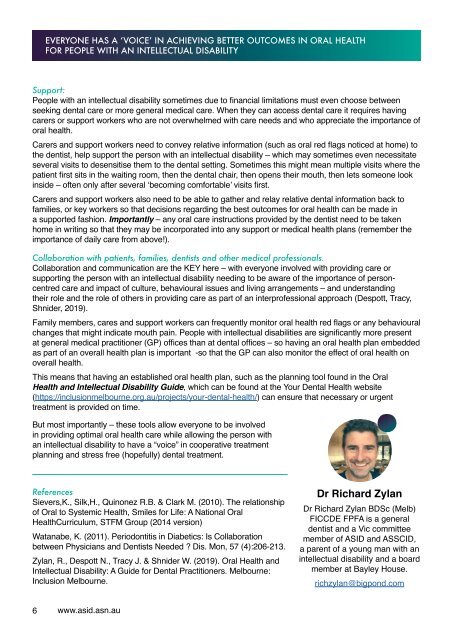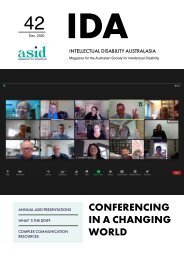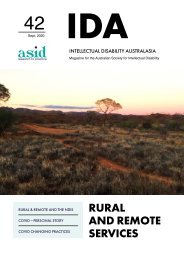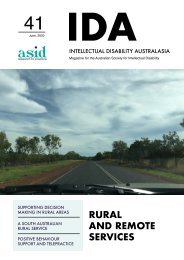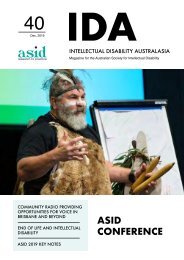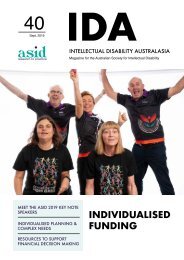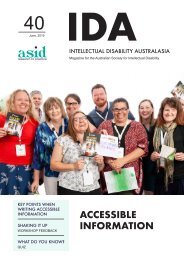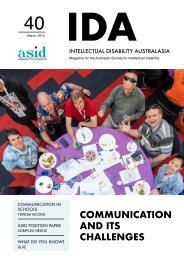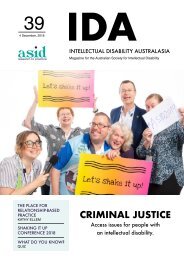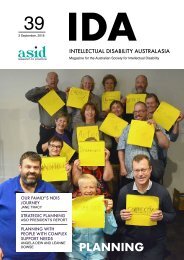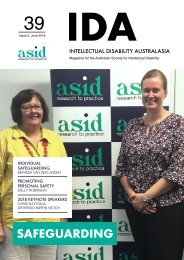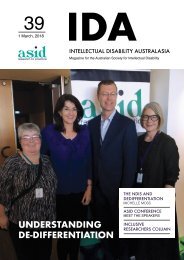IDA Volume 41 Issue 1 March 2020 (Mar 2020)
Create successful ePaper yourself
Turn your PDF publications into a flip-book with our unique Google optimized e-Paper software.
EVERYONE HAS A ‘VOICE’ IN ACHIEVING BETTER OUTCOMES IN ORAL HEALTH<br />
FOR PEOPLE WITH AN INTELLECTUAL DISABILITY<br />
Support:<br />
People with an intellectual disability sometimes due to financial limitations must even choose between<br />
seeking dental care or more general medical care. When they can access dental care it requires having<br />
carers or support workers who are not overwhelmed with care needs and who appreciate the importance of<br />
oral health.<br />
Carers and support workers need to convey relative information (such as oral red flags noticed at home) to<br />
the dentist, help support the person with an intellectual disability – which may sometimes even necessitate<br />
several visits to desensitise them to the dental setting. Sometimes this might mean multiple visits where the<br />
patient first sits in the waiting room, then the dental chair, then opens their mouth, then lets someone look<br />
inside – often only after several ‘becoming comfortable’ visits first.<br />
Carers and support workers also need to be able to gather and relay relative dental information back to<br />
families, or key workers so that decisions regarding the best outcomes for oral health can be made in<br />
a supported fashion. Importantly – any oral care instructions provided by the dentist need to be taken<br />
home in writing so that they may be incorporated into any support or medical health plans (remember the<br />
importance of daily care from above!).<br />
Collaboration with patients, families, dentists and other medical professionals.<br />
Collaboration and communication are the KEY here – with everyone involved with providing care or<br />
supporting the person with an intellectual disability needing to be aware of the importance of personcentred<br />
care and impact of culture, behavioural issues and living arrangements – and understanding<br />
their role and the role of others in providing care as part of an interprofessional approach (Despott, Tracy,<br />
Shnider, 2019).<br />
Family members, cares and support workers can frequently monitor oral health red flags or any behavioural<br />
changes that might indicate mouth pain. People with intellectual disabilities are significantly more present<br />
at general medical practitioner (GP) offices than at dental offices – so having an oral health plan embedded<br />
as part of an overall health plan is important -so that the GP can also monitor the effect of oral health on<br />
overall health.<br />
This means that having an established oral health plan, such as the planning tool found in the Oral<br />
Health and Intellectual Disability Guide, which can be found at the Your Dental Health website<br />
(https://inclusionmelbourne.org.au/projects/your-dental-health/) can ensure that necessary or urgent<br />
treatment is provided on time.<br />
But most importantly – these tools allow everyone to be involved<br />
in providing optimal oral health care while allowing the person with<br />
an intellectual disability to have a “voice” in cooperative treatment<br />
planning and stress free (hopefully) dental treatment.<br />
References<br />
Sievers,K., Silk,H., Quinonez R.B. & Clark M. (2010). The relationship<br />
of Oral to Systemic Health, Smiles for Life: A National Oral<br />
HealthCurriculum, STFM Group (2014 version)<br />
Watanabe, K. (2011). Periodontitis in Diabetics: Is Collaboration<br />
between Physicians and Dentists Needed ? Dis. Mon, 57 (4):206-213.<br />
Zylan, R., Despott N., Tracy J. & Shnider W. (2019). Oral Health and<br />
Intellectual Disability: A Guide for Dental Practitioners. Melbourne:<br />
Inclusion Melbourne.<br />
Dr Richard Zylan<br />
Dr Richard Zylan BDSc (Melb)<br />
FICCDE FPFA is a general<br />
dentist and a Vic committee<br />
member of ASID and ASSCID,<br />
a parent of a young man with an<br />
intellectual disability and a board<br />
member at Bayley House.<br />
richzylan@bigpond.com<br />
6 www.asid.asn.au


